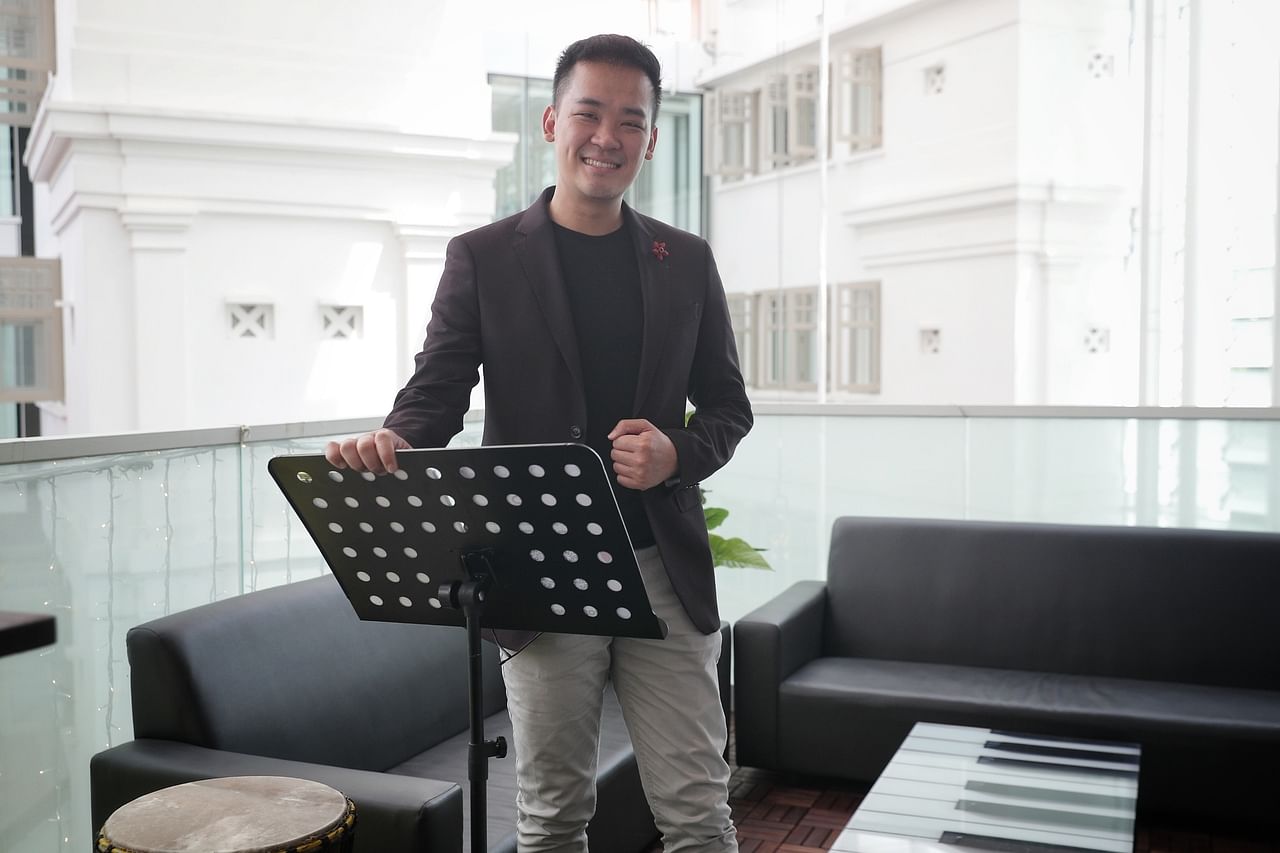SINGAPORE - In between presentations and school coursework, third-year university student Amir Mirza makes sure to find time to attend virtual choir practices with the Voices of Singapore (VOS) community chorus every Wednesday evening.
The National University of Singapore (NUS) undergrad continued singing with the choir even after practices were moved onto Zoom because of the pandemic.
"It's something I look forward to every week. As a university student, things get really hectic sometimes. (The practices) keep me stable and grounded," says the 24-year-old bass. "Besides the singing, there is also the social part of being connected with friends."
During the sessions, members log on and sing alone, muted, while chorus leaders lead vocal warm-ups and score revision - a new experience with "limitations", but worthwhile, he says.
"At the end of the day, it's about the passion for singing - it is a source of comfort and solace for us, and something we use to express our sorrows and grief in this critical period. Even though it's online, we share our voices together."
Better known as the group that organised the 900-strong virtual singalong of Dick Lee's Home in April, VOS started out as an annual choral festival - the VOS Choral Festival - in 2015.
Only in March last year was the VOS Choral Society officially formed and registered as a non-profit arts organisation, with five permanent chorus groups under it: the Children's Choir, Ladies Choir, Community Chorus, VOS Singers and Coronation Singers.
VOS founder and artistic director Darius Lim, 34, believes the choir is one of the first to go online and try virtual practices. It happened because of a Covid-19 scare back in February.
"One of our members had been exposed to a Covid-19 patient from the Safra cluster," he says, referring to a cluster of Covid-19 infections traced to a Chinese New Year gathering in Safra Jurong. "We freaked out, to say the least. So we cancelled the whole season of concerts and decided to virtualise everything."

Snowballing stories of families and friends separated abroad because of the pandemic touched him: "We thought, what if we have a virtual musical platform where we can unite families? Although they're not physically together, it'd give them some sense of comfort."
The Home video garnered over 226,000 views on Facebook and sparked a nationwide singalong.
Chorus members have been kept busy since. In June, the children's choir presented a migrant worker virtual choir project A World Together, in partnership with local charity Healthserve.
In July, there was a singing project with Unicef, fund-raising concert ChildAid, and the VOS Choral Festival that featured other local choirs. Most recently, the entire choral society sang in the President's Star Charity concert yesterday.
Anyone can join the community chorus, which has no auditions. Members range from 18 years old to 80 and come from all walks of life, says Mr Lim. In fact, interest in the community chorus has skyrocketed in the past six months, with the full strength having tripled from 48 to 165.
Some are even based overseas and call into the weekly virtual practices at odd hours of the night.
"I think a lot of the motivation comes from riding off the interactions and one another's energy," Mr Lim says. "We may be on Zoom, but it's not just me talking - the chat bar on the side is constantly ringing with people asking questions. It's a very interactive thing."
Val Chong, who sings in the children's choir, believes singing with VOS helped her mental health and wellness during this time.
"The circuit breaker period was challenging for me as I felt disconnected and isolated from the rest of the community. I missed the physical interaction of performing together in a choir," says the 17-year-old School of the Arts Singapore student.
"But the weekly practice sessions made me realise the power of music as a creative platform. We had fun games and activities that bonded us, and our conductor Mr Darius would always check in on our well-being and mental state. I am proud to call the choir my second home."
HEALING WITH SONG
Besides such community projects, VOS has also been an advocate of using music to further medical research here.
Since 2015, Mr Lim has been running a dementia prevention research choir in partnership with Jurong Town Council and the NUS.

To determine if singing in a choir can prevent dementia, senior volunteers were given choral training once a week. Every few months, they took MRI scans to investigate the efficacy of choral singing on their emotional and mental health, says Mr Lim. NUS piloted the research, while he led the music planning - which VOS took over last year. The initiative has been put on pause indefinitely since February.
VOS also started a music-making programme for children with special needs last month. Supported by Temasek Trust, the free 10-week-long programme takes place entirely over Zoom.
The sessions show two conductors, trained in special needs education, singing and using props and visual aids. Children get to learn rhythms and songs, and sing in other languages.
"The programme is very physical - there is a lot of kinesthetic movements; tapping of the shoulders and feet. It's music-making just for fun, with no emphasis on choral excellence," says Mr Lim.
Response has been robust, with more than 60 sign-ups from both within and outside the special needs community.
And soon, higher-functioning individuals "wanting a challenge" will be able to get their fix too. VOS will pilot a special needs chamber choir in January, called Starlight Voices. "It will cater to the higher-functioning individuals who are looking for greater challenges in music, where they can sing in parts and do serious choral work," Mr Lim says.
In the next six months, he also plans to start corporate choirs - a "huge thing" in countries like Wales where he did his postgraduate studies.
Such corporate recreational activities have been proven to build friendship and workplace harmony, and improve the work-life environment, he says. "We ultimately want to bring singing to offices because that's where the highest stress levels are."
On his passion for such projects, he says his aim is simply to bring choral music to the masses, and advocate that "everyone can sing".
Growing up, he found the choral scene exclusive, with its main audience being friends and family of those performing.
Life-changing experiences watching the National Day Parade rehearsal in Primary Five, and at a rugby match in Wales, also made him realise the importance of community spirit in culture-building.
"There were 60,000 men in the stadium cheering, and they spontaneously broke out into song, singing their Welsh songs," he recalls. "There was no stigma in male singing, and everyone was just so proud of where they come from.
"Experiences like these really helped me to feel we are building something bigger than ourselves. That's what I feel most passionate about - giving people renewed purpose through music."
THERAPEUTIC BENEFITS OF SINGING
Believe it or not, anyone can sing.
More specifically, anyone can benefit from singing, regardless of age or demographic, say experts. There are many physiological, psychological and emotional benefits.
Singing can be an excellent form of exercise, says music therapist Grace Low from the Music & Creative Therapy unit at Singapore General Hospital.
"Even if you are healthy, your body will get a workout when you employ proper singing techniques by activating your diaphragm. It helps you build a stronger diaphragm and be more aware of your body's breathing process," she says.
The psychological and emotional benefits are also immense.
She adds: "It is a natural antidepressant. It decreases the levels of stress hormones in your body and can take your mind off the day's troubles to boost your mood."
Association for Music Therapy Singapore president Calvin Eng, 28, says the association has received more inquiries on music therapy during the current coronavirus pandemic.
"Specifically, on how music might be able to support our mental well-being," says Mr Eng, a board certified music therapist.
"Singing allows us to express ourselves and our feelings, relieve stress and feel better." It increases oxygen level and releases endorphins that make us feel good and relaxed, he adds.
Experts agree that beyond the actual singing, the social nature of singing in a group or choir has added benefits.
Be it choral singing or karaoke with friends, singers in a group may experience a sense of belonging and cohesiveness, says Ms Low. "Studies have shown that it helps to increase social bonding, which leads to an increase of human social behaviours like laughter."
Mr Eng says that singing in a choir supports our well-being by promoting social connection.
"Music has been a natural reason for people to gather since early cultures. A 2011 study on 16 adult outpatients with chronic mental disorders noted that membership and participation in a choir may promote creative opportunities for personal growth and establish regular social habits," he adds.
"When we gather and do things together in synchronisation, whether in rhythm or voice, the communicative power is much greater than when one does it solo."
In stressful times, music-making as self-care may be an option to consider.
Indeed, one of the many ways is to sing, says Ms Low. "It helps reduce stress and anxiety that in turn improve our sleep quality and mood."
Reaping the benefits of music can also be as simple as sharing a song with your loved one that reminds you of them, says Mr Eng. "You could even get on a video call and sing together - no one expects you to sing (well), just enjoy and sing away."
But be sure to listen to your needs and participate "in your own time", he advises.
"Whether it is singing, learning a new instrument, or being part of a music experience, it is important to give space and allow an individual to join the process when he or she is ready."












